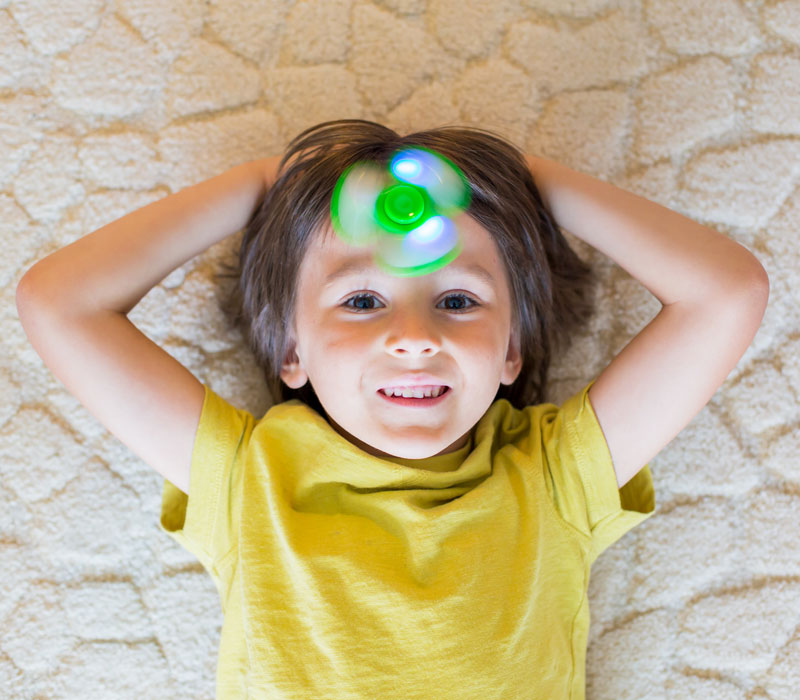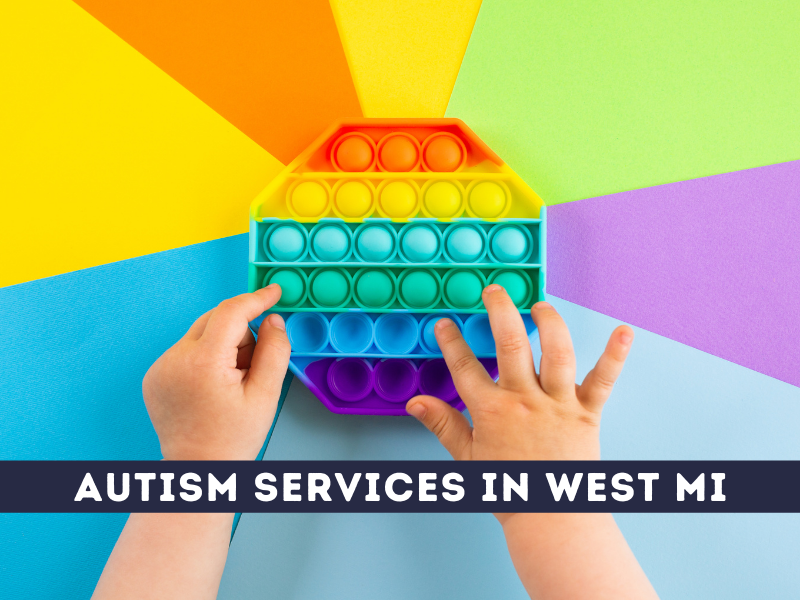Could it be a Developmental Delay?
West Michigan is teeming with medical professionals who are ready to support you and your kid. They are here for you when things are going well and especially when they’re not.
So who can you call when your gut tells you something is off? You’re not sure what it is, exactly, but your child has missed a few key milestones.
Maybe your kid is behind on walking, talking, or something else, and you wonder – is this developmental delay or possibly a disability emerging? The unknown, the questioning, the wondering, and the work to uncover what is going on can be very overwhelming.
When you’re in that boat, you call one of the professionals in this guide.
That’s what I did when my son was diagnosed with autism at age seven.
At first I didn’t know where to start.
But once the shock of the diagnosis wore off, the first thing I did was track down local resources and community support groups for parents of children with disabilities.
Hopefully this guide will also help you find the resources and support you need as you navigate this time.
in this article
Featured Partners
These local therapists and resource centers are dedicated to helping children with developmental delays or disabilities.
This is a sponsored section of GRKIDS.
Mood Disorders, Anxiety & Depression
Mental health encompasses a wide range of conditions.
Mental health encompasses a wide range of conditions. The most common are anxiety and depression, but there are also many other mood disorders out there, such as bipolar disorder or seasonal affective disorder.
Mental health issues can affect any child at any age.
They can be hard to pinpoint – after all, growing up is all about learning to handle your emotions and all children experience emotional extremes. You might be wondering, could these sudden outbursts be normal, or a sign of something else going on?
If you’re wondering, “does my kid need counseling?” take notes of what you’re seeing and ask your pediatrician. And once you’re going down this road, learn how using a child therapist works so you’re ready if you get that referral.

ADHD
ADHD (attention-deficit/hyperactivity disorder) is one of the most common neurodevelopmental disorders of childhood.
And contrary to popular belief, you don’t outgrow ADHD. It lasts into adulthood.
Kids with ADHD often have trouble focusing, are easily distracted and struggle with organization. Many of these children are also impulsive.
Even though it’s common, living with ADHD is a struggle. It’s hard for kids (and adults!) to sit still and focus and they often feel misunderstood because they don’t operate in the world like society expects.
If you suspect your child has ADHD, these local pros offer ADHD testing and can connect you with therapists if your child has ADHD.
Often, ADHD is inherited, which means that you might also have it. Don’t overlook the signs that you might have ADHD as an adult. Because there is help for you, too!

Language and Speech Delays
Language and speech delays cover both struggles with communicating and/or understanding language.
Does your child have no issue speaking, but does not seem to understand instructions you give them? Perhaps your child knows what you’re saying, but struggles to form words to respond.
These delays can have physical causes like hearing issues, a cleft palate or a tongue tie. Other times, the delays stem from neurological delays or disabilities.
Kids with these delays are easily frustrated and can seem very irritable. But it’s only because they want to communicate and can’t!
Connecting your kid with a speech therapist is imperative to helping a child with a speech or language delay, and these specialists work wonders.

Cognitive Delays
Cognitive delays describe children who are behind their peers in learning and solving problems.
Does your child take longer to grasp concepts that other kids their age have mastered? Do they not seem to have an awareness appropriate for their age or lack curiosity?
These delays (which can sometimes become lifelong, and therefore disabilities) could be genetic or caused by illness or injury.
Getting help for kids with cognitive delays greatly enhances their chances at success – both at school and in life.
Many professionals can help kids with these delays. You might be referred to a speech therapist, behavior therapist, physical therapist or occupational therapist.
Autism Spectrum Disorder
Autism spectrum disorder (ASD) is a neurological developmental disability.
People with ASD often struggle with social cues and interaction and become obsessive with repetitive behaviors or interests. They usually learn and move differently than other children.
It used to be that kids with neurological disorders were often criticized by society – both at home and at school. Parents would be frustrated with their children and their children had no clue why they were misunderstood.
Nowadays we understand that kids with neurological disorders just navigate the world differently. Parents now have resources available to both help them understand their neurodivergent kid and for the child to understand how their brain works.
This comprehensive list of autism services helps kids and families in West Michigan thrive.

Dyslexia
Dyslexia is a disability that prevents children (and adults) from understanding written words and processing sounds. They can even struggle with spoken words.
Because it drastically affects academic performance, dyslexia is considered a learning disability.
Being unable to process written instruction makes it increasingly difficult to keep up in class, even if they have the cognition to learn.
If your child struggles to read, ask if their school can test them for dyslexia. Schools often have reading specialists available or other resources to help these kids.
Depending on the severity of the diagnosis, speech or language therapists could also be helpful.
Motor Delays
Motor delays happen when children are behind their peers in either gross motor or fine motor skills.
Motor delays happen when children are behind their peers in either gross motor or fine motor skills.
They might struggle to jump on two feet, hold and use a crayon, or brush their teeth.
Pediatricians regularly screen patients for these delays, and early intervention can really help.
Children with motor delays benefit from occupational therapists and/or sensory-processing therapy.
More Resources
Here’s some more places to go for support for children with developmental delays or disabilities.
FAQs
What is a Developmental Delay?
A developmental delay occurs when a child does not reach the same developmental milestones as their peers.
Delays can be when a child’s development slows, stops, or even reverses.
These milestones are based on what a majority of children reach by a certain age and include cognitive, speech, motor (gross and fine), social and emotional skills.
Examples are a child babbling by six months old, being able to kick a ball by age two, and counting to ten by age five.
How are Developmental Delays Diagnosed?
Doctors and nurses screen children for developmental delays and will refer you to a specialist if a delay is suspected.
Screening helps them determine if a child is learning basic skills comparable to their peers. Sometimes children are just slightly slower to learn a skill and will accomplish the goal on their own.
At other times, children benefit from seeing a physical, mental or occupational therapist, or other specialist.
Expect doctors to ask you questions about your family’s medical history, do a physical exam on your child, and interact/play with them to assess their skills.
If a delay is suspected, you and your child will be referred to a specialist for assessment.
Assessment specialists include neuropsychologists or developmental behavior doctors.
Can Developmental Delays be Corrected?
Sometimes a child outgrows a developmental delay. Other times, extra help is needed.
The key is early intervention, which is shown to significantly reduce the impact these delays have.
And even if a child could overcome their delay on their own, many parents enjoy using therapists to help their child along. Common therapy and support options for developmental delays include:
• Physical Therapy
• Occupational Therapy
• Speech and Language Therapy
• Behavioral Therapy
• Special Education
Are Developmental Delays and Developmental Disabilities the Same Thing?
No, they are not the same. A developmental delay is temporary, and a child usually outgrows or overcomes it through therapy.
Developmental disabilities are lifelong. These children also benefit from therapy, which will give them tools to be their best self.
What is a Developmental Disability?
Developmental disabilities impact a child’s day-to-day functioning in areas of physical, cognitive, speech or behavior skills.
These disabilities are present in infancy or childhood and are with a person for life.
Conditions that start in the teen years or adulthood are not considered developmental disabilities.
Is Autism a Developmental Disability?
Yes, autism falls under the umbrella of developmental disability.
What do I do if I Think My Child has a Developmental Disability?
Talk with your child’s doctor if you think there could be a problem.
You may be referred to a developmental-behavioral pediatrician or other pediatric specialists for further evaluation.
In the State of Michigan, Early On provides free evaluations and interventions for qualifying families for children ages birth to 3 years.
Parents of school-aged children can work with their local school district’s special education office to determine if a child has a disability. Children with developmental delays or disabilities could qualify for a 504 plan or IEP to help them with their education.


Hello Pediatric Therapy in Byron Center offers physical therapy, occupational therapy, and speech language pathology. Their clinicians are top notch and a joy to work with.